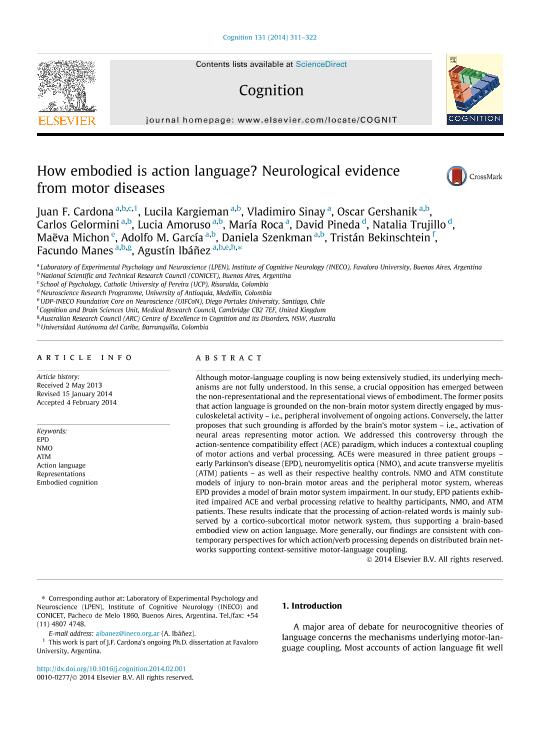Artículo
How embodied is action language? Neurological evidence from motor diseases
Cardona Londoño, Juan Felipe ; Kargieman, Lucila
; Kargieman, Lucila ; Sinay, Vladimiro; Gershanik, Oscar Samuel; Gelormini Lezama, Carlos
; Sinay, Vladimiro; Gershanik, Oscar Samuel; Gelormini Lezama, Carlos ; Amoruso, Lucía
; Amoruso, Lucía ; Roca, Martin; Pineda, David; Trujillo Arias, Natalia
; Roca, Martin; Pineda, David; Trujillo Arias, Natalia ; Michon, Maeva; García, Adolfo Martín
; Michon, Maeva; García, Adolfo Martín ; Szenkman, Daniela
; Szenkman, Daniela ; Bekinschtein, Tristán Andrés
; Bekinschtein, Tristán Andrés ; Manes, Facundo Francisco
; Manes, Facundo Francisco ; Ibañez, Agustin Mariano
; Ibañez, Agustin Mariano
 ; Kargieman, Lucila
; Kargieman, Lucila ; Sinay, Vladimiro; Gershanik, Oscar Samuel; Gelormini Lezama, Carlos
; Sinay, Vladimiro; Gershanik, Oscar Samuel; Gelormini Lezama, Carlos ; Amoruso, Lucía
; Amoruso, Lucía ; Roca, Martin; Pineda, David; Trujillo Arias, Natalia
; Roca, Martin; Pineda, David; Trujillo Arias, Natalia ; Michon, Maeva; García, Adolfo Martín
; Michon, Maeva; García, Adolfo Martín ; Szenkman, Daniela
; Szenkman, Daniela ; Bekinschtein, Tristán Andrés
; Bekinschtein, Tristán Andrés ; Manes, Facundo Francisco
; Manes, Facundo Francisco ; Ibañez, Agustin Mariano
; Ibañez, Agustin Mariano
Fecha de publicación:
04/2014
Editorial:
Elsevier Science
Revista:
Cognition
ISSN:
0010-0277
Idioma:
Inglés
Tipo de recurso:
Artículo publicado
Clasificación temática:
Resumen
Although motor-language coupling is now being extensively studied, its underlying mechanisms are not fully understood. In this sense, a crucial opposition has emerged between the non-representational and the representational views of embodiment. The former posits that action language is grounded on the non-brain motor system directly engaged by musculoskeletal activity – i.e., peripheral involvement of ongoing actions. Conversely, the latter proposes that such grounding is afforded by the brain’s motor system – i.e., activation of neural areas representing motor action. We addressed this controversy through the action-sentence compatibility effect (ACE) paradigm, which induces a contextual coupling of motor actions and verbal processing. ACEs were measured in three patient groups – early Parkinson’s disease (EPD), neuromyelitis optica (NMO), and acute transverse myelitis (ATM) patients – as well as their respective healthy controls. NMO and ATM constitute models of injury to non-brain motor areas and the peripheral motor system, whereas EPD provides a model of brain motor system impairment. In our study, EPD patients exhibited impaired ACE and verbal processing relative to healthy participants, NMO, and ATM patients. These results indicate that the processing of action-related words is mainly subserved by a cortico-subcortical motor network system, thus supporting a brain-based embodied view on action language. More generally, our findings are consistent with contemporary perspectives for which action/verb processing depends on distributed brain networks supporting context-sensitive motor-language coupling.
Palabras clave:
Epd
,
Nmo
,
Atm
,
Action Language
,
Representations
,
Embodied Cognition
Archivos asociados
Licencia
Identificadores
Colecciones
Articulos(SEDE CENTRAL)
Articulos de SEDE CENTRAL
Articulos de SEDE CENTRAL
Citación
Cardona Londoño, Juan Felipe; Kargieman, Lucila; Sinay, Vladimiro; Gershanik, Oscar Samuel; Gelormini Lezama, Carlos; et al.; How embodied is action language? Neurological evidence from motor diseases; Elsevier Science; Cognition; 131; 2; 4-2014; 311-322
Compartir
Altmétricas



